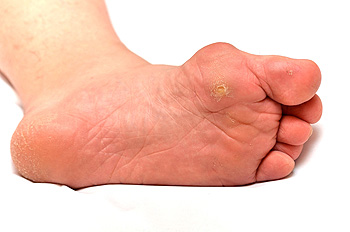 Research has indicated that bunions may be caused by genetic factors. Additional reasons why bunions may develop may be from wearing shoes that do not have adequate room for the toes to move freely in. This may result in the big toe pointing toward the other toes, and the bone may protrude on the side of the big toe. There may be medical conditions that exist which can precede the formation of bunions. These may include gout and rheumatoid arthritis. Many patients choose to treat the symptoms of bunions with orthotics or bunion pads. If the symptoms are severe, having surgery performed may be a viable option for permanent removal of the bunion. An effective way of preventing this condition from developing may be to wear shoes that fit correctly and have a lower heel. If you have severe bunions, it is suggested to speak to a podiatrist who can guide you toward proper treatment.
Research has indicated that bunions may be caused by genetic factors. Additional reasons why bunions may develop may be from wearing shoes that do not have adequate room for the toes to move freely in. This may result in the big toe pointing toward the other toes, and the bone may protrude on the side of the big toe. There may be medical conditions that exist which can precede the formation of bunions. These may include gout and rheumatoid arthritis. Many patients choose to treat the symptoms of bunions with orthotics or bunion pads. If the symptoms are severe, having surgery performed may be a viable option for permanent removal of the bunion. An effective way of preventing this condition from developing may be to wear shoes that fit correctly and have a lower heel. If you have severe bunions, it is suggested to speak to a podiatrist who can guide you toward proper treatment.
If you are suffering from bunion pain, contact Dr. Dean D. Hinners of Illinois. Our doctor can provide the care you need to keep you pain-free and on your feet.
What Is a Bunion?
Bunions are painful bony bumps that usually develop on the inside of the foot at the joint of the big toe. As the deformity increases over time, it may become painful to walk and wear shoes. Women are more likely to exacerbate existing bunions since they often wear tight, narrow shoes that shift their toes together. Bunion pain can be relieved by wearing wider shoes with enough room for the toes.
Causes
- Genetics – some people inherit feet that are more prone to bunion development
- Inflammatory Conditions - rheumatoid arthritis and polio may cause bunion development
Symptoms
- Redness and inflammation
- Pain and tenderness
- Callus or corns on the bump
- Restricted motion in the big toe
In order to diagnose your bunion, your podiatrist may ask about your medical history, symptoms, and general health. Your doctor might also order an x-ray to take a closer look at your feet. Nonsurgical treatment options include orthotics, padding, icing, changes in footwear, and medication. If nonsurgical treatments don’t alleviate your bunion pain, surgery may be necessary.
If you have any questions, please feel free to contact one of our offices located in Metropolis and Eldorado, IL . We offer the newest diagnostic and treatment technologies for all your foot care needs.
Read more about What Are Bunions?